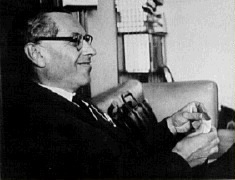born: Mar 13, 1913 in Budapest, Hungary
died: Sept 20, 1996 in Warsaw, Poland
Most prolific mathematician in history — over 1000 publications with more than 250 different coauthors. No home, no job, no bank account, no drivers license, no wife. Always traveling. Always doing mathematics.
And there is his most important gift: walking into a mathematician’s office and announcing, “My brain is open.” It means that he is ready to pick up work wherever he left off during his last visit. Erdös works with colleagues around the world and juggles his time among dozens of problems in fields ranging from number theory to topology. He writes 1500 letters a year.
(John Tierney)
Both of Paul Erdös’ (air-dish) parents were high school mathematics teachers in Hungary, and most of his early education was at home since he did not take well to the disciplined instruction in the schools. He was something of a prodigy ( “At the age of 4, I told my mother that if you take 250 from 100 you have 150 below 0 .” ) and entered the University Pazmany Peter at 17. Four years later he had a Ph.D. and went to study in England. Early in his career he had a few one-year positions and he sometimes returned to Hungary for limited periods of time, but other than those he did not spend even one month in one place — by choice. His lifestyle was very simple: he did mathematics, traveled to give mathematical talks, stayed with mathematicians who provided him with meals and lodging, talked mathematics with his hosts, did mathematics, and traveled some more. Friends at one stop would make sure he got on the right flight, and others met the plane at his destination. He recently traveled from the U.S. to Japan with only his clothes, notebooks and $50 — no checkbook or credit cards — and did just fine. The “payment” his friends received for all of this help, “Uncle Paul sitting,” was the chance to help and to talk mathematics and share problems with the most prolific mathematician of all time. His brain was open, and always working.
Ron Graham of Bell Labs, a first-rate mathematician himself, deposited all of Erdös’ checks, paid his bills and arranged such mundane matters as dental appointments. In 1984 Erdös won the $50,000 Wolf Prize and gave all but $750 to relatives and a scholarship fund in memory of his mother. His friends urged him to slow down from the time he turned 60 (and began referring to himself as L.D. — for Living Dead), but Erdös didn’t follow their advice at all.
The following are just a few quotes and stories by and about Erdös:
I never wanted material possessions. There is an old Greek saying that the wise man has nothing he cannot carry in his hands. If you have something beautiful, you have to look out for it, so I would rather give it away. I always say, ‘Private property is a nuisance.’
Erdös, who has worn the same threadbare shirt for the past four days, did not understand the subtle class distinction between a pasta salad and a tuna casserole. (John Tierney)
Erdös had his own vocabulary for certain objects: an “epsilon” is a child, “bosses” are women, and the S.F. “Supreme Fascist” is god.
Erdös offered monetary rewards for solutions to unsolved problems he wanted to see solved. These ranged from $25 for problems he thought woouldn’t be very difficult to $10,000 for a problem in number theory he considered “hopeless.” The largest amount he ever had had to pay was $1000.
Since Erdös published with so many different coauthors (over 250), a new term has been coined: Erdös Numbers. A person gets an Erdös number of 1 by publishing a joint paper with Erdös, an Erdös number of 2 by publishing a joint paper with someone with an Erdös number of 1, and so on. Some one who published multiple papers with Erdös has a fractional Erdös number: 2 joint papers = 1/2; 10 joint papers = 1/10; etc.
Erdös liked to quote a colleague’s remark that “A mathematician is a machine for converting coffee into theorems.”
After his mother’s death in 1971, a doctor prescribed amphetamines as antidepressants, and Erdös continued taking small daily doses under medical supervision. But friends were concerned and offered him $500 if he could give them up for one month. Erdös warned his friends “You are setting mathematics back a month,” but he won the bet. He was quoted during that month as saying, “Before, when I looked at a piece of blank paper my mind was filled with ideas. Now all I see is a blank piece of paper.”
You know, all those rules that may be perfectly correct for normal people, make no sense for prodigies. To say that Bach should pay any attention to how he was socially adjusted is just a bad joke. It is obvious that this is secondary.
The following message from Miklós Simonovits was posted on the Internet on Sept 21, 1996:
“Paul Erdös died Friday afternoon (20 September, 1996) in Warsaw. Early morning he felt some health problems, in a hotel in Warsaw. So he was carried into a hospital, where he died in the afternoon. He was 83.”
(For Erdös information on the Web, click on The Erdös Number Project. Be sure to scroll to the bottom of the page to see a picture of Erdös, and follow some of the links from there.)
Condensed from “Paul Erdös is in town. His brain is open.” by John Tierney in Science 84, October, 1984, pages 40-47, and “Paul Erdös” by G.L. Alexanderson in Mathematical People, pages 82 – 91, edited by Albers and Alexanderson and published by Birkhauser Boston Publishing Company in 1985.
Last Updated September 21, 2022

